Critical Scholarship: Literary Criticism in Education Leadership
VerifiedAdded on 2023/03/23
|7
|1585
|93
Essay
AI Summary
This essay provides a comprehensive analysis of critical scholarship, with a specific focus on the role of literary criticism within the field of education leadership. The essay emphasizes the importance of literary criticism as a tool for evaluating literature, enhancing understanding of complex concepts, developing interpretation skills, and improving writing abilities. It explores how literary criticism enables readers to objectively assess publications, grasp the intended messages, and determine the accuracy and credibility of the content. Furthermore, the essay highlights the benefits of literary criticism in equipping education leadership professionals with skills to analyze and interpret various publications, which is crucial for informed decision-making and professional development. The essay also touches upon the significance of literary criticism in developing writing skills essential for scholarly contributions and research. It references several studies and publications to support its arguments and emphasizes the necessity of possessing strong literary criticism skills for success in education leadership.
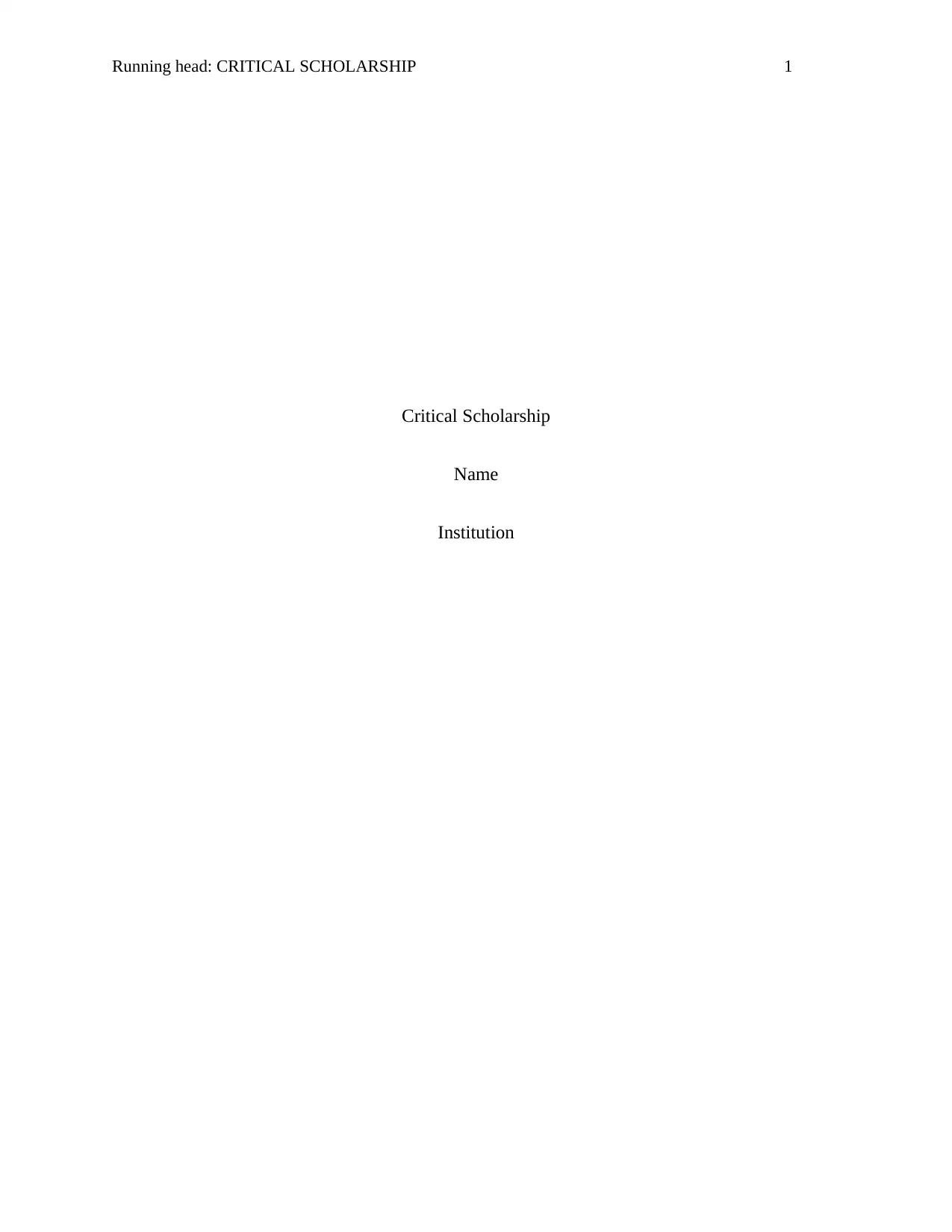
Running head: CRITICAL SCHOLARSHIP 1
Critical Scholarship
Name
Institution
Critical Scholarship
Name
Institution
Paraphrase This Document
Need a fresh take? Get an instant paraphrase of this document with our AI Paraphraser
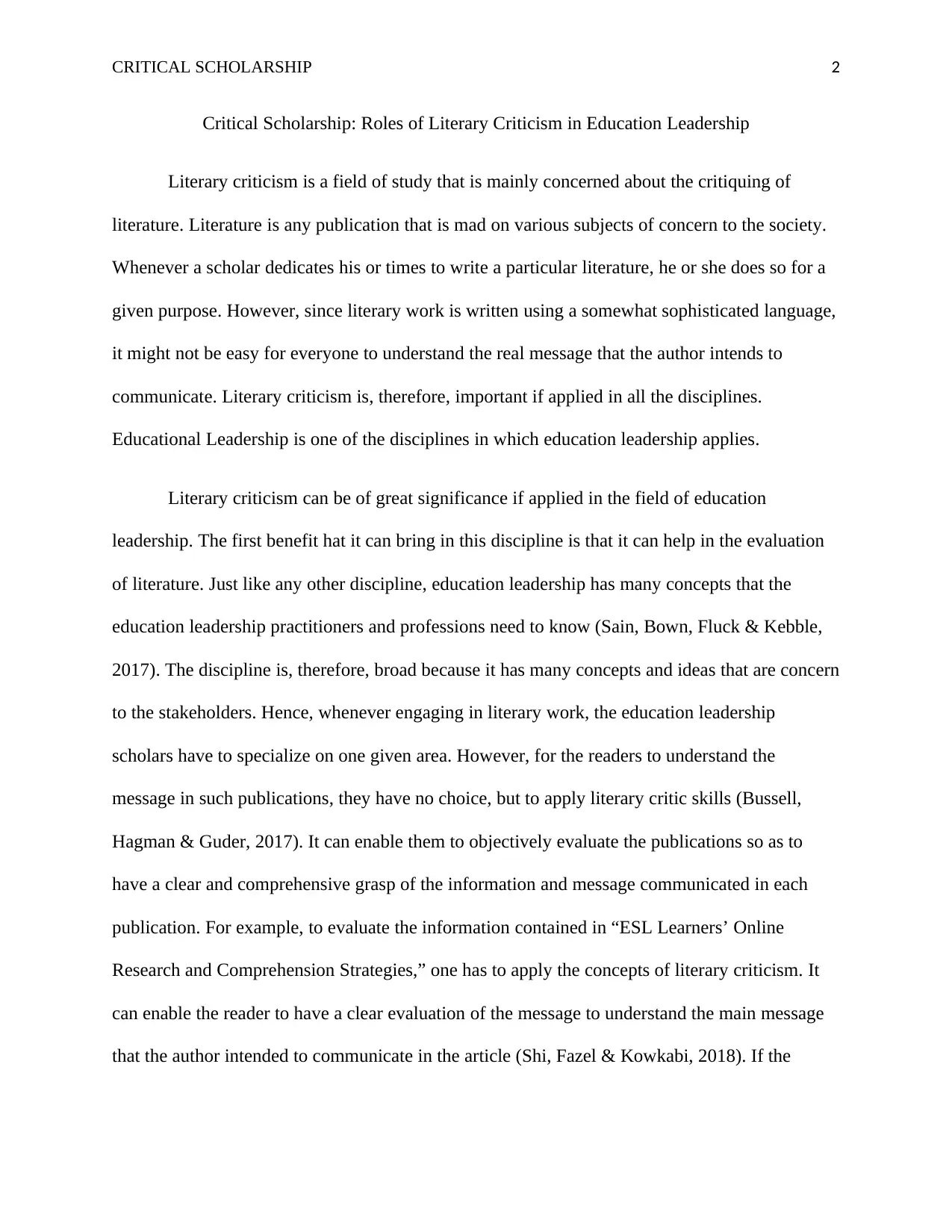
CRITICAL SCHOLARSHIP 2
Critical Scholarship: Roles of Literary Criticism in Education Leadership
Literary criticism is a field of study that is mainly concerned about the critiquing of
literature. Literature is any publication that is mad on various subjects of concern to the society.
Whenever a scholar dedicates his or times to write a particular literature, he or she does so for a
given purpose. However, since literary work is written using a somewhat sophisticated language,
it might not be easy for everyone to understand the real message that the author intends to
communicate. Literary criticism is, therefore, important if applied in all the disciplines.
Educational Leadership is one of the disciplines in which education leadership applies.
Literary criticism can be of great significance if applied in the field of education
leadership. The first benefit hat it can bring in this discipline is that it can help in the evaluation
of literature. Just like any other discipline, education leadership has many concepts that the
education leadership practitioners and professions need to know (Sain, Bown, Fluck & Kebble,
2017). The discipline is, therefore, broad because it has many concepts and ideas that are concern
to the stakeholders. Hence, whenever engaging in literary work, the education leadership
scholars have to specialize on one given area. However, for the readers to understand the
message in such publications, they have no choice, but to apply literary critic skills (Bussell,
Hagman & Guder, 2017). It can enable them to objectively evaluate the publications so as to
have a clear and comprehensive grasp of the information and message communicated in each
publication. For example, to evaluate the information contained in “ESL Learners’ Online
Research and Comprehension Strategies,” one has to apply the concepts of literary criticism. It
can enable the reader to have a clear evaluation of the message to understand the main message
that the author intended to communicate in the article (Shi, Fazel & Kowkabi, 2018). If the
Critical Scholarship: Roles of Literary Criticism in Education Leadership
Literary criticism is a field of study that is mainly concerned about the critiquing of
literature. Literature is any publication that is mad on various subjects of concern to the society.
Whenever a scholar dedicates his or times to write a particular literature, he or she does so for a
given purpose. However, since literary work is written using a somewhat sophisticated language,
it might not be easy for everyone to understand the real message that the author intends to
communicate. Literary criticism is, therefore, important if applied in all the disciplines.
Educational Leadership is one of the disciplines in which education leadership applies.
Literary criticism can be of great significance if applied in the field of education
leadership. The first benefit hat it can bring in this discipline is that it can help in the evaluation
of literature. Just like any other discipline, education leadership has many concepts that the
education leadership practitioners and professions need to know (Sain, Bown, Fluck & Kebble,
2017). The discipline is, therefore, broad because it has many concepts and ideas that are concern
to the stakeholders. Hence, whenever engaging in literary work, the education leadership
scholars have to specialize on one given area. However, for the readers to understand the
message in such publications, they have no choice, but to apply literary critic skills (Bussell,
Hagman & Guder, 2017). It can enable them to objectively evaluate the publications so as to
have a clear and comprehensive grasp of the information and message communicated in each
publication. For example, to evaluate the information contained in “ESL Learners’ Online
Research and Comprehension Strategies,” one has to apply the concepts of literary criticism. It
can enable the reader to have a clear evaluation of the message to understand the main message
that the author intended to communicate in the article (Shi, Fazel & Kowkabi, 2018). If the
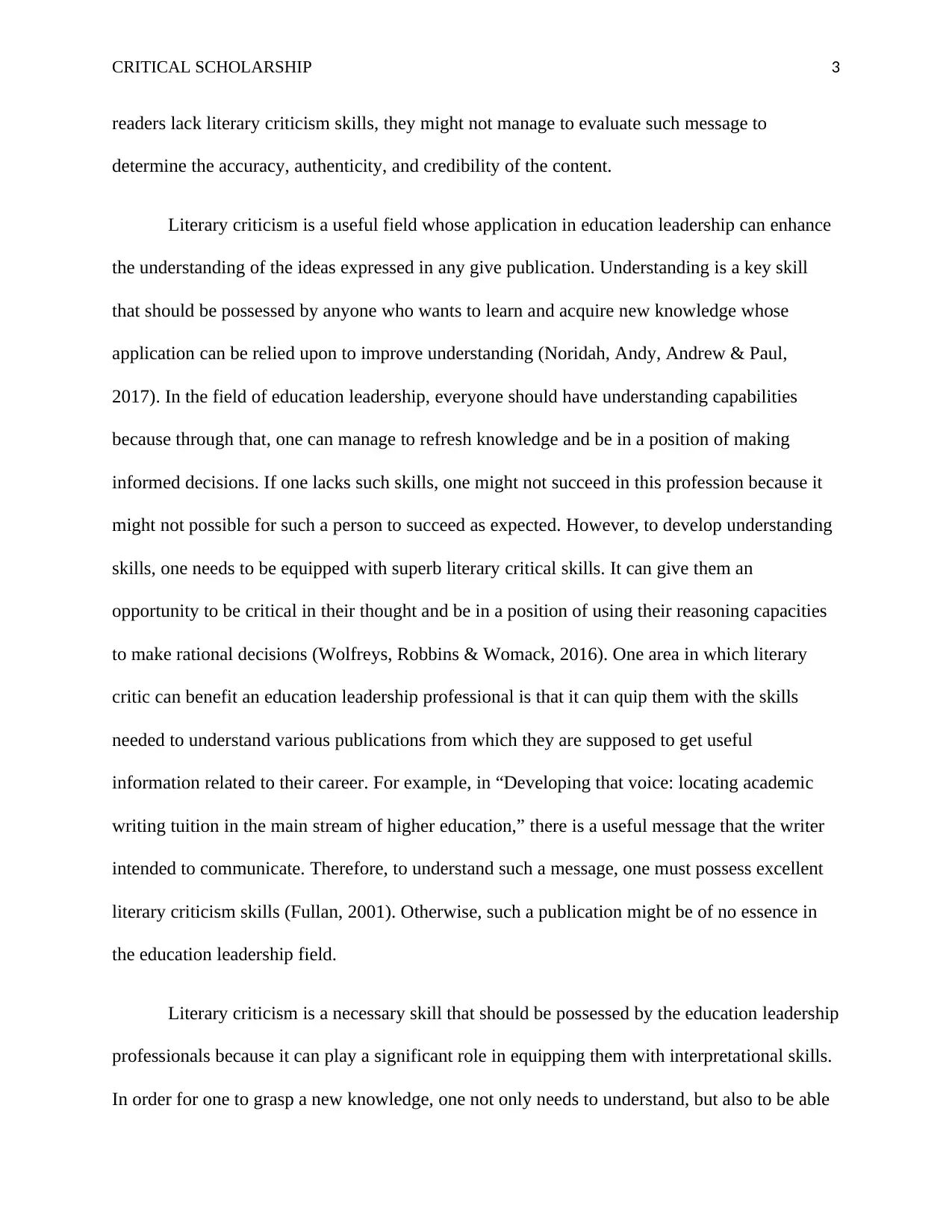
CRITICAL SCHOLARSHIP 3
readers lack literary criticism skills, they might not manage to evaluate such message to
determine the accuracy, authenticity, and credibility of the content.
Literary criticism is a useful field whose application in education leadership can enhance
the understanding of the ideas expressed in any give publication. Understanding is a key skill
that should be possessed by anyone who wants to learn and acquire new knowledge whose
application can be relied upon to improve understanding (Noridah, Andy, Andrew & Paul,
2017). In the field of education leadership, everyone should have understanding capabilities
because through that, one can manage to refresh knowledge and be in a position of making
informed decisions. If one lacks such skills, one might not succeed in this profession because it
might not possible for such a person to succeed as expected. However, to develop understanding
skills, one needs to be equipped with superb literary critical skills. It can give them an
opportunity to be critical in their thought and be in a position of using their reasoning capacities
to make rational decisions (Wolfreys, Robbins & Womack, 2016). One area in which literary
critic can benefit an education leadership professional is that it can quip them with the skills
needed to understand various publications from which they are supposed to get useful
information related to their career. For example, in “Developing that voice: locating academic
writing tuition in the main stream of higher education,” there is a useful message that the writer
intended to communicate. Therefore, to understand such a message, one must possess excellent
literary criticism skills (Fullan, 2001). Otherwise, such a publication might be of no essence in
the education leadership field.
Literary criticism is a necessary skill that should be possessed by the education leadership
professionals because it can play a significant role in equipping them with interpretational skills.
In order for one to grasp a new knowledge, one not only needs to understand, but also to be able
readers lack literary criticism skills, they might not manage to evaluate such message to
determine the accuracy, authenticity, and credibility of the content.
Literary criticism is a useful field whose application in education leadership can enhance
the understanding of the ideas expressed in any give publication. Understanding is a key skill
that should be possessed by anyone who wants to learn and acquire new knowledge whose
application can be relied upon to improve understanding (Noridah, Andy, Andrew & Paul,
2017). In the field of education leadership, everyone should have understanding capabilities
because through that, one can manage to refresh knowledge and be in a position of making
informed decisions. If one lacks such skills, one might not succeed in this profession because it
might not possible for such a person to succeed as expected. However, to develop understanding
skills, one needs to be equipped with superb literary critical skills. It can give them an
opportunity to be critical in their thought and be in a position of using their reasoning capacities
to make rational decisions (Wolfreys, Robbins & Womack, 2016). One area in which literary
critic can benefit an education leadership professional is that it can quip them with the skills
needed to understand various publications from which they are supposed to get useful
information related to their career. For example, in “Developing that voice: locating academic
writing tuition in the main stream of higher education,” there is a useful message that the writer
intended to communicate. Therefore, to understand such a message, one must possess excellent
literary criticism skills (Fullan, 2001). Otherwise, such a publication might be of no essence in
the education leadership field.
Literary criticism is a necessary skill that should be possessed by the education leadership
professionals because it can play a significant role in equipping them with interpretational skills.
In order for one to grasp a new knowledge, one not only needs to understand, but also to be able
⊘ This is a preview!⊘
Do you want full access?
Subscribe today to unlock all pages.

Trusted by 1+ million students worldwide
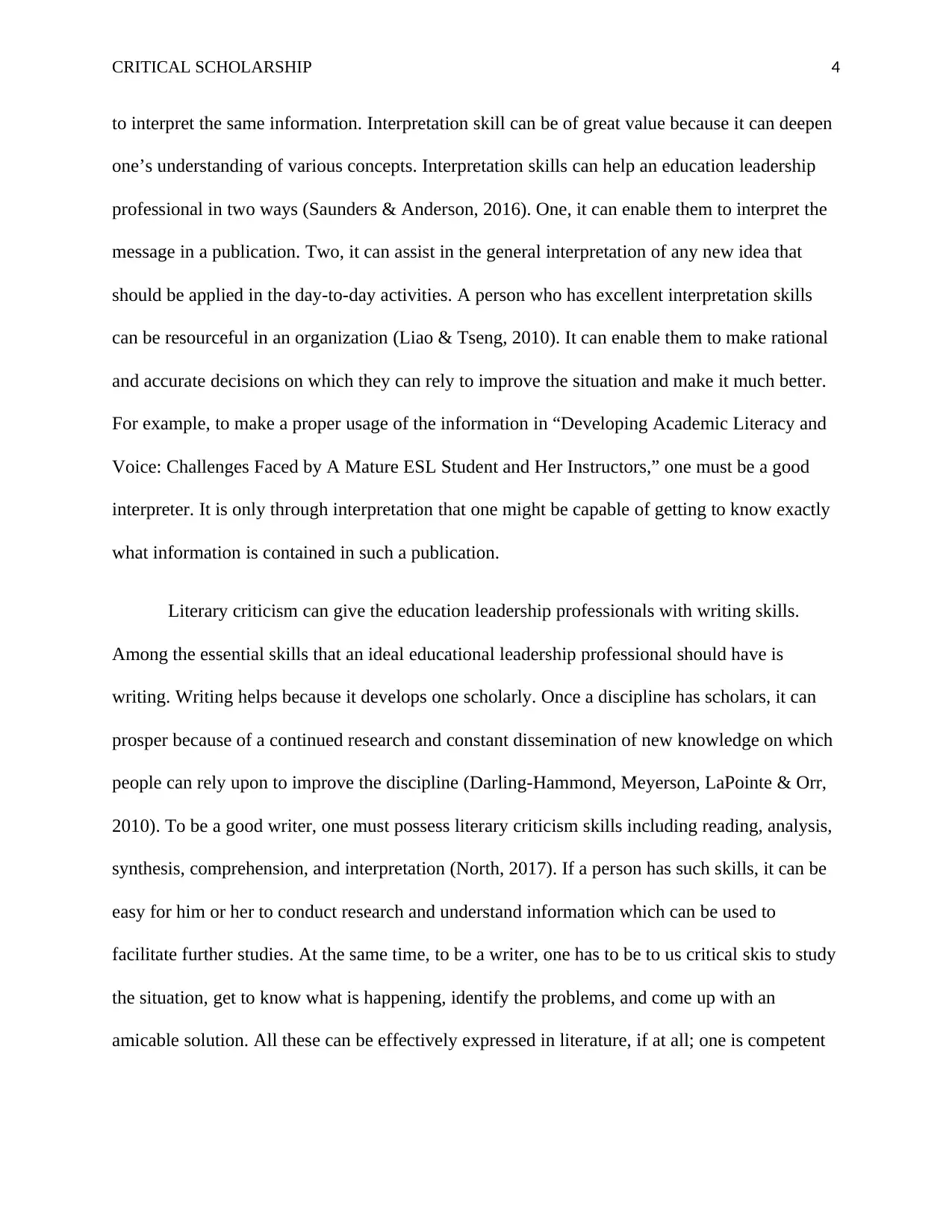
CRITICAL SCHOLARSHIP 4
to interpret the same information. Interpretation skill can be of great value because it can deepen
one’s understanding of various concepts. Interpretation skills can help an education leadership
professional in two ways (Saunders & Anderson, 2016). One, it can enable them to interpret the
message in a publication. Two, it can assist in the general interpretation of any new idea that
should be applied in the day-to-day activities. A person who has excellent interpretation skills
can be resourceful in an organization (Liao & Tseng, 2010). It can enable them to make rational
and accurate decisions on which they can rely to improve the situation and make it much better.
For example, to make a proper usage of the information in “Developing Academic Literacy and
Voice: Challenges Faced by A Mature ESL Student and Her Instructors,” one must be a good
interpreter. It is only through interpretation that one might be capable of getting to know exactly
what information is contained in such a publication.
Literary criticism can give the education leadership professionals with writing skills.
Among the essential skills that an ideal educational leadership professional should have is
writing. Writing helps because it develops one scholarly. Once a discipline has scholars, it can
prosper because of a continued research and constant dissemination of new knowledge on which
people can rely upon to improve the discipline (Darling-Hammond, Meyerson, LaPointe & Orr,
2010). To be a good writer, one must possess literary criticism skills including reading, analysis,
synthesis, comprehension, and interpretation (North, 2017). If a person has such skills, it can be
easy for him or her to conduct research and understand information which can be used to
facilitate further studies. At the same time, to be a writer, one has to be to us critical skis to study
the situation, get to know what is happening, identify the problems, and come up with an
amicable solution. All these can be effectively expressed in literature, if at all; one is competent
to interpret the same information. Interpretation skill can be of great value because it can deepen
one’s understanding of various concepts. Interpretation skills can help an education leadership
professional in two ways (Saunders & Anderson, 2016). One, it can enable them to interpret the
message in a publication. Two, it can assist in the general interpretation of any new idea that
should be applied in the day-to-day activities. A person who has excellent interpretation skills
can be resourceful in an organization (Liao & Tseng, 2010). It can enable them to make rational
and accurate decisions on which they can rely to improve the situation and make it much better.
For example, to make a proper usage of the information in “Developing Academic Literacy and
Voice: Challenges Faced by A Mature ESL Student and Her Instructors,” one must be a good
interpreter. It is only through interpretation that one might be capable of getting to know exactly
what information is contained in such a publication.
Literary criticism can give the education leadership professionals with writing skills.
Among the essential skills that an ideal educational leadership professional should have is
writing. Writing helps because it develops one scholarly. Once a discipline has scholars, it can
prosper because of a continued research and constant dissemination of new knowledge on which
people can rely upon to improve the discipline (Darling-Hammond, Meyerson, LaPointe & Orr,
2010). To be a good writer, one must possess literary criticism skills including reading, analysis,
synthesis, comprehension, and interpretation (North, 2017). If a person has such skills, it can be
easy for him or her to conduct research and understand information which can be used to
facilitate further studies. At the same time, to be a writer, one has to be to us critical skis to study
the situation, get to know what is happening, identify the problems, and come up with an
amicable solution. All these can be effectively expressed in literature, if at all; one is competent
Paraphrase This Document
Need a fresh take? Get an instant paraphrase of this document with our AI Paraphraser
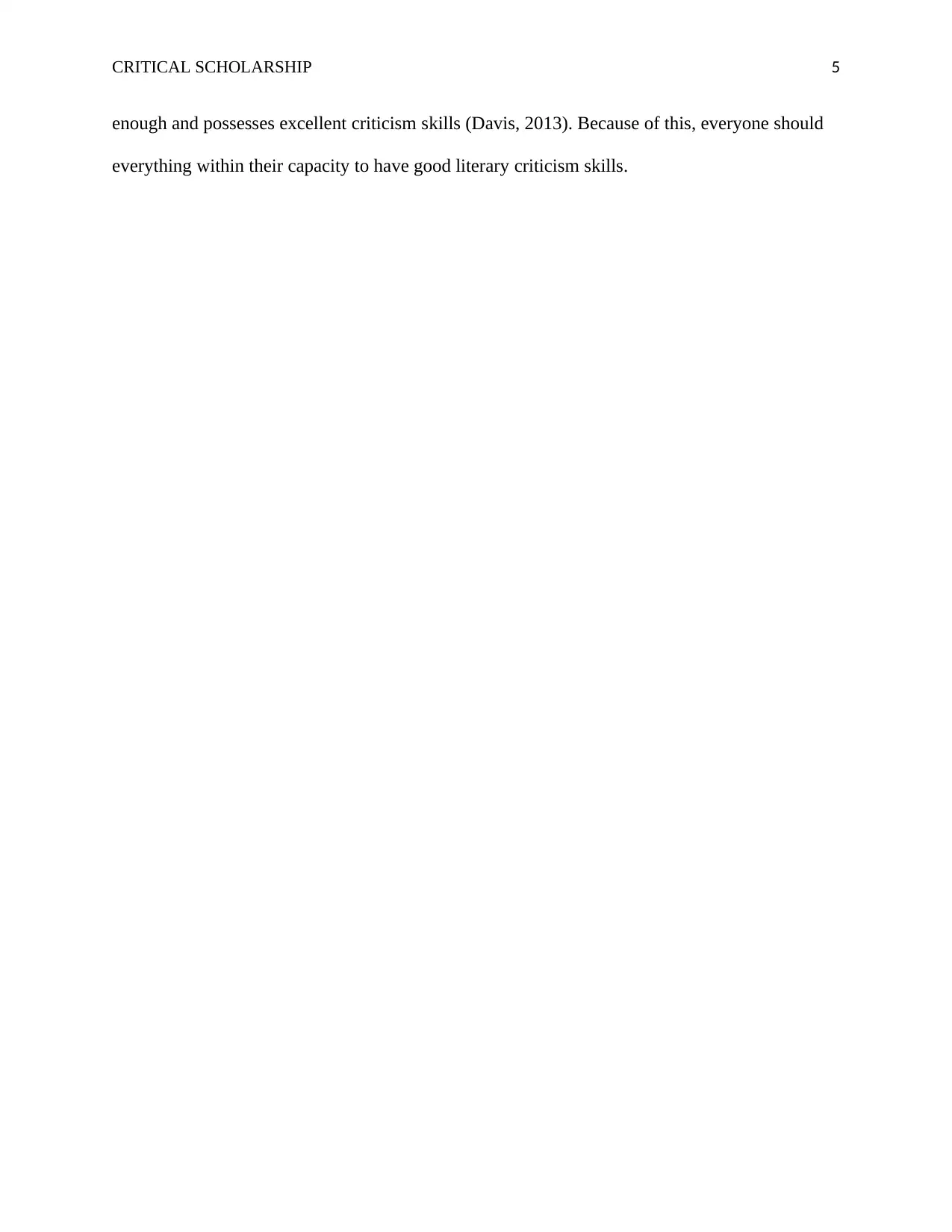
CRITICAL SCHOLARSHIP 5
enough and possesses excellent criticism skills (Davis, 2013). Because of this, everyone should
everything within their capacity to have good literary criticism skills.
enough and possesses excellent criticism skills (Davis, 2013). Because of this, everyone should
everything within their capacity to have good literary criticism skills.
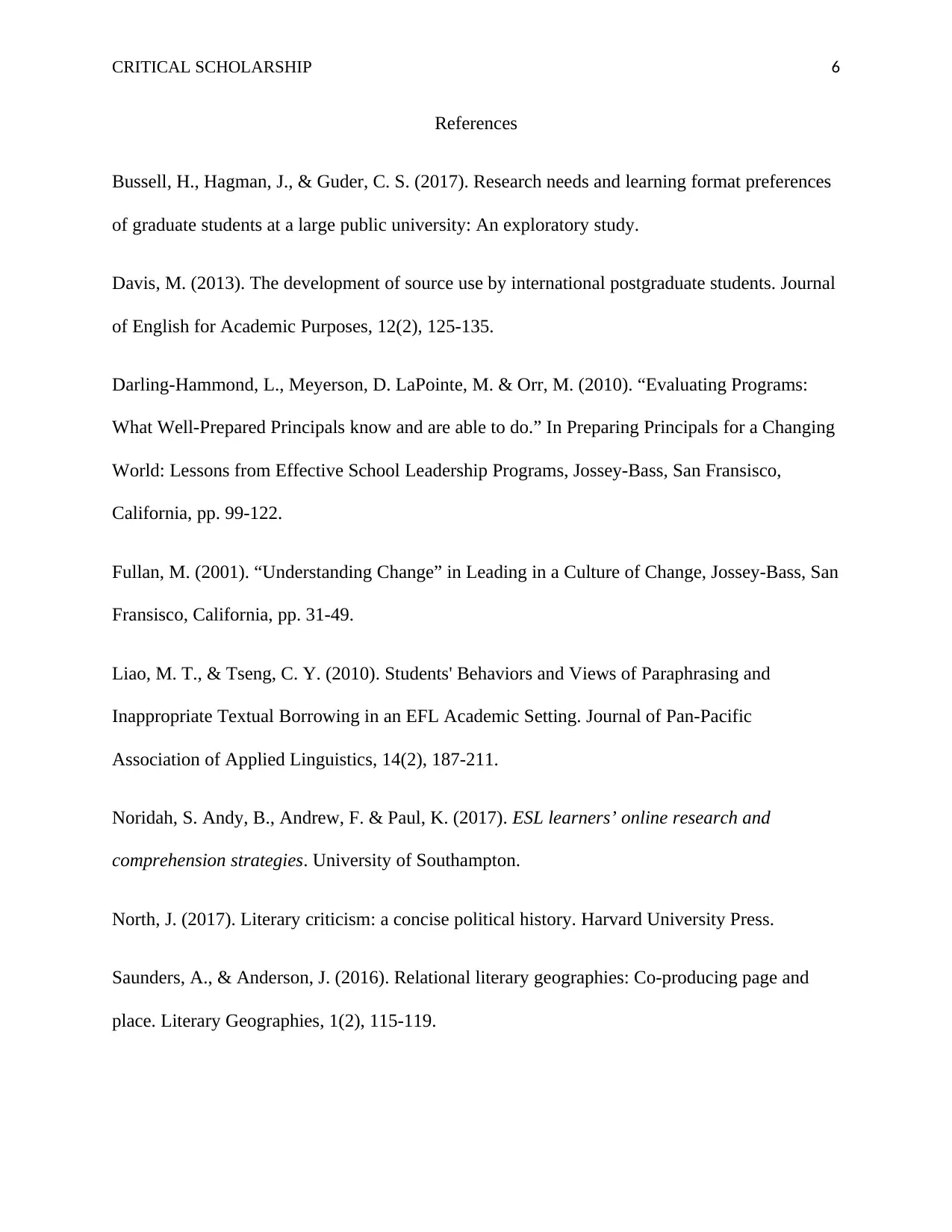
CRITICAL SCHOLARSHIP 6
References
Bussell, H., Hagman, J., & Guder, C. S. (2017). Research needs and learning format preferences
of graduate students at a large public university: An exploratory study.
Davis, M. (2013). The development of source use by international postgraduate students. Journal
of English for Academic Purposes, 12(2), 125-135.
Darling-Hammond, L., Meyerson, D. LaPointe, M. & Orr, M. (2010). “Evaluating Programs:
What Well-Prepared Principals know and are able to do.” In Preparing Principals for a Changing
World: Lessons from Effective School Leadership Programs, Jossey-Bass, San Fransisco,
California, pp. 99-122.
Fullan, M. (2001). “Understanding Change” in Leading in a Culture of Change, Jossey-Bass, San
Fransisco, California, pp. 31-49.
Liao, M. T., & Tseng, C. Y. (2010). Students' Behaviors and Views of Paraphrasing and
Inappropriate Textual Borrowing in an EFL Academic Setting. Journal of Pan-Pacific
Association of Applied Linguistics, 14(2), 187-211.
Noridah, S. Andy, B., Andrew, F. & Paul, K. (2017). ESL learners’ online research and
comprehension strategies. University of Southampton.
North, J. (2017). Literary criticism: a concise political history. Harvard University Press.
Saunders, A., & Anderson, J. (2016). Relational literary geographies: Co-producing page and
place. Literary Geographies, 1(2), 115-119.
References
Bussell, H., Hagman, J., & Guder, C. S. (2017). Research needs and learning format preferences
of graduate students at a large public university: An exploratory study.
Davis, M. (2013). The development of source use by international postgraduate students. Journal
of English for Academic Purposes, 12(2), 125-135.
Darling-Hammond, L., Meyerson, D. LaPointe, M. & Orr, M. (2010). “Evaluating Programs:
What Well-Prepared Principals know and are able to do.” In Preparing Principals for a Changing
World: Lessons from Effective School Leadership Programs, Jossey-Bass, San Fransisco,
California, pp. 99-122.
Fullan, M. (2001). “Understanding Change” in Leading in a Culture of Change, Jossey-Bass, San
Fransisco, California, pp. 31-49.
Liao, M. T., & Tseng, C. Y. (2010). Students' Behaviors and Views of Paraphrasing and
Inappropriate Textual Borrowing in an EFL Academic Setting. Journal of Pan-Pacific
Association of Applied Linguistics, 14(2), 187-211.
Noridah, S. Andy, B., Andrew, F. & Paul, K. (2017). ESL learners’ online research and
comprehension strategies. University of Southampton.
North, J. (2017). Literary criticism: a concise political history. Harvard University Press.
Saunders, A., & Anderson, J. (2016). Relational literary geographies: Co-producing page and
place. Literary Geographies, 1(2), 115-119.
⊘ This is a preview!⊘
Do you want full access?
Subscribe today to unlock all pages.

Trusted by 1+ million students worldwide
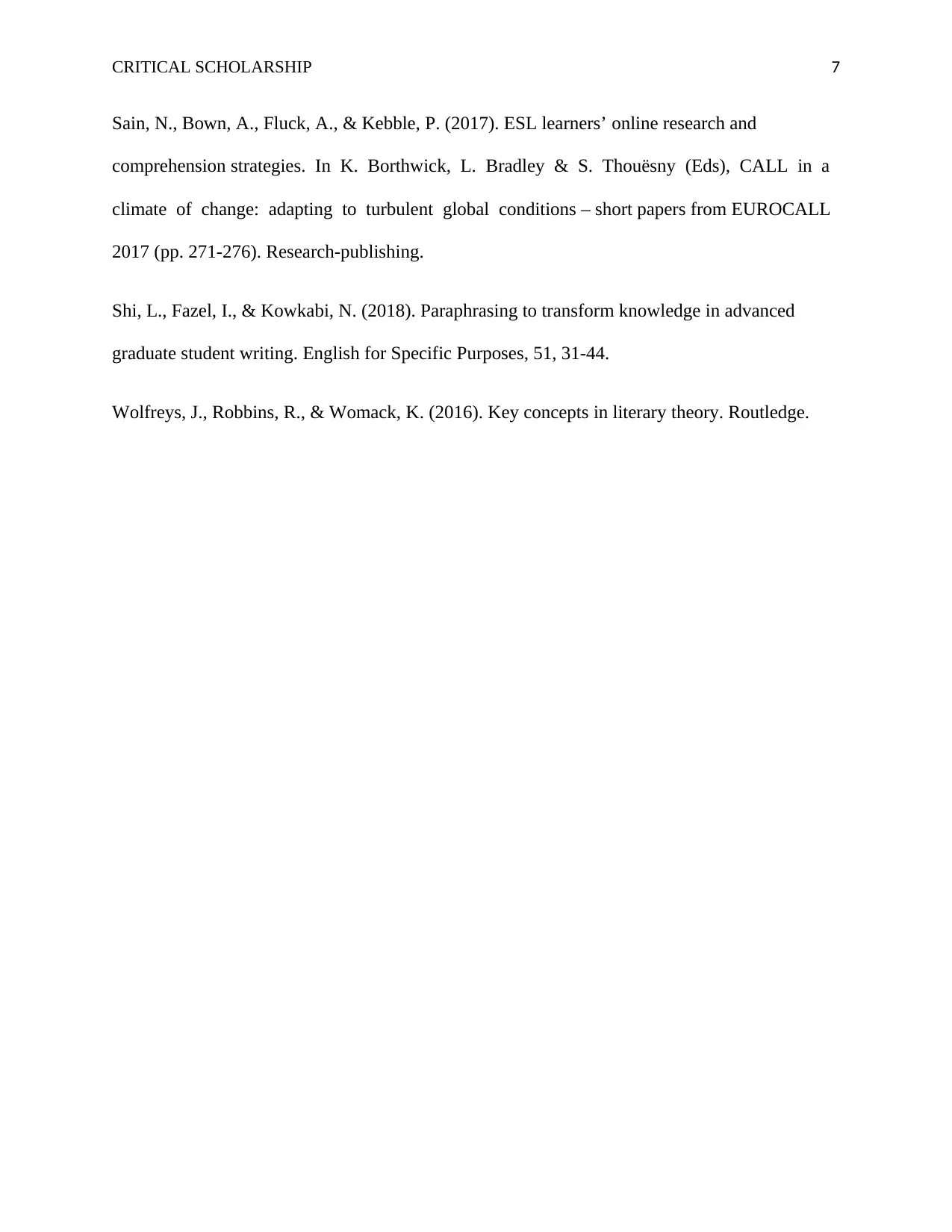
CRITICAL SCHOLARSHIP 7
Sain, N., Bown, A., Fluck, A., & Kebble, P. (2017). ESL learners’ online research and
comprehension strategies. In K. Borthwick, L. Bradley & S. Thouësny (Eds), CALL in a
climate of change: adapting to turbulent global conditions – short papers from EUROCALL
2017 (pp. 271-276). Research-publishing.
Shi, L., Fazel, I., & Kowkabi, N. (2018). Paraphrasing to transform knowledge in advanced
graduate student writing. English for Specific Purposes, 51, 31-44.
Wolfreys, J., Robbins, R., & Womack, K. (2016). Key concepts in literary theory. Routledge.
Sain, N., Bown, A., Fluck, A., & Kebble, P. (2017). ESL learners’ online research and
comprehension strategies. In K. Borthwick, L. Bradley & S. Thouësny (Eds), CALL in a
climate of change: adapting to turbulent global conditions – short papers from EUROCALL
2017 (pp. 271-276). Research-publishing.
Shi, L., Fazel, I., & Kowkabi, N. (2018). Paraphrasing to transform knowledge in advanced
graduate student writing. English for Specific Purposes, 51, 31-44.
Wolfreys, J., Robbins, R., & Womack, K. (2016). Key concepts in literary theory. Routledge.
1 out of 7
Your All-in-One AI-Powered Toolkit for Academic Success.
+13062052269
info@desklib.com
Available 24*7 on WhatsApp / Email
![[object Object]](/_next/static/media/star-bottom.7253800d.svg)
Unlock your academic potential
Copyright © 2020–2026 A2Z Services. All Rights Reserved. Developed and managed by ZUCOL.


